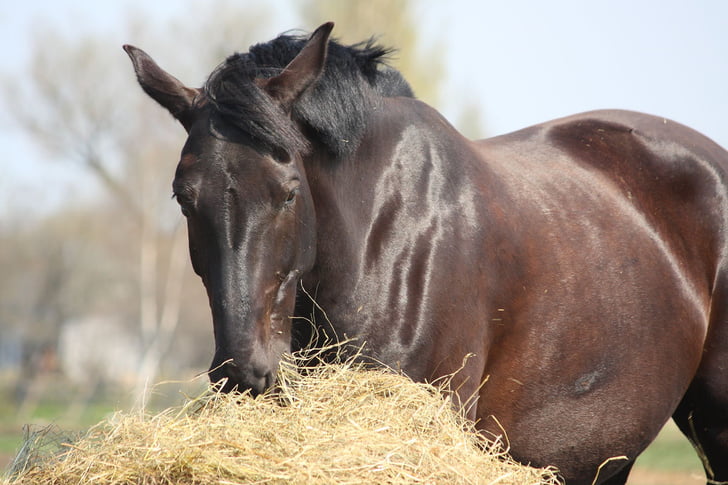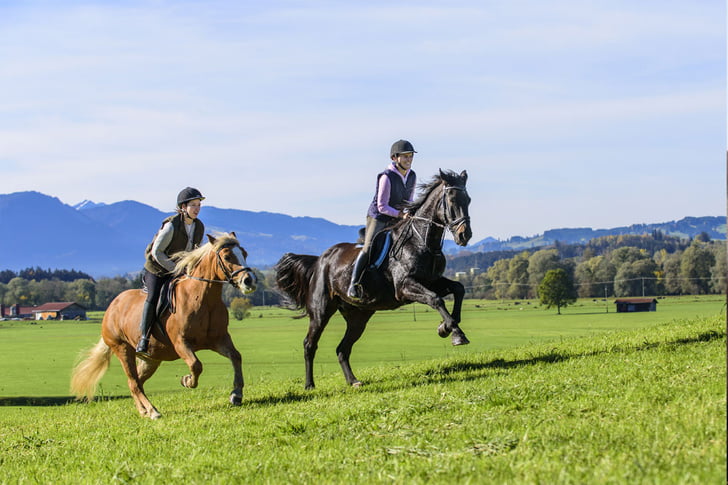Best feed for horses: Concentrated feeds
Best feed for horses, The concentrated feed should secure and increase the horse’s willingness to perform. Read here which horses need concentrated feed and which composition you have to pay attention to.
Special muesli mixes for eczema, for seniors, for Icelandic people, for ponies, for competitive athletes, for breeding horses, for young horses: if you have the choice, you are spoiled for choice. Read here which horses should be fed concentrate and what this concentrate should consist of.
When do horses need concentrated feed?
Rough feed, vitamins, minerals, and trace elements are among the horse’s basic needs when it comes to feeding. With sufficient feeding of good hay and grazing, the maintenance needs of many horses are already covered. So horses don’t necessarily need concentrated feed.
However, if the horse’s energy needs are not covered by roughage and mineral feed alone, it should be fed concentrated feed. This is particularly important for the following horses:
- Sport horses
- Leisure horses with increased performance
- pregnant mares
- Foals and young horses
- older horses
- Horses with special needs or diseases
Read Also: Benefits of horse riding for body and soul
Which ingredients provide strength?
Higher energy values characterize concentrated feed for horses. Different types of grain, oils, and sugar provide energy. Concentrates for horses are also enriched with vitamins, minerals, and important trace elements.
Depending on the type of concentrate, it can be fed to the horse in muesli or pellets. The composition of the concentrate must be adapted to the needs of the horse. You should, therefore, always take a close look at the label on the feed.
Choosing the right concentrate
The individual concentrate mixes differ greatly in their composition. It would help if you always chose a concentrate that is tailored to your horse’s needs.
Concentrated feed for recreational horses

Sufficient roughage is essential for horses. © Stock.adobe.com/virgonira
In the case of increased stress or if the required energy cannot be obtained from roughage alone, it makes sense to feed a suitable concentrate for pure leisure horses. A low energy value characterizes concentrated feed for leisure horses. Also, only a small amount of sugar and starch should be added. Concentrated feed for recreational horses is often grain-free and enriched with important raw fibers.
Concentrated feed for sport horses
A high energy value should characterize concentrated feed for horses that require a lot of performance. Grains and oils provide energy. The area of application of the horse should also be considered when choosing the concentrate. For example, Showjumpers need a lot of energy in a short time, while the power stores of horses in endurance sports are used for a long time.
Read Also: Concentrated feed for horses
Concentrated feed for pregnant mares
From the ninth month onwards, a pregnant mare’s energy requirement increase by 1.25-1.4 times its actual maintenance requirement. The protein requirement also increases. Later on, the pregnant mare also needs more calcium, phosphorus, and magnesium. For optimal development of the foal in the womb and to keep the mare healthy, a suitable concentrate should be fed.
Concentrated feed for growing foals
Young horses have an increased need as they grow. Foals and growing horses need important amino acids, magnesium, and an adapted calcium-phosphorus ratio for healthy bone development. The needs of the growing horse are taken into account in special foal feed.
Concentrated feed for seniors
With age, the horse’s metabolism slows down. Concentrated feed for seniors contains essential proteins that the body can digest particularly well. A high fiber content supports digestion. Important vitamins and minerals are also added to the concentrate.
Concentrated feed to support health
In addition to various additional feeds, there are also types of concentrated feed that strengthen the horse’s health in various areas. Depending on the composition, the concentrate is then tailored to the needs of the horse. When feeding concentrated feed, problems of the respiratory tract, digestive tract, etc., can also be addressed.
This could also be of interest to you: Lemieux saddle pad
This is how much-concentrated feed the horse needs

Best feed for horses
When feeding concentrated feed, attention must be paid to the optimal composition of the feed and the amount of feed. Too large amounts pollute the organism and can even be dangerous. If the horse needs a lot of concentrated feed, for example, in the case of a high-performance athlete or also in the case of broodmares or stallions, the amount must therefore be divided into several small portions per day.
Horses have small stomachs that are set up for continuous intake of small amounts. In the wild, horses spend a large part of the day taking in the feed. Concentrated food does not correspond to its nature and should, therefore, always be given with care. Per serving, more than 0.5 kg of concentrated feed should never be given per 100 kg of the horse’s weight. For a warm-blooded horse weighing around 600 kg, this means: The concentrated feed ration must be divided up so that a maximum of 3 kg is fed per meal.
The manufacturer’s feeding recommendation should serve as a guideline, but the actual amount of feed must be adapted to the horse’s actual needs.
Correct storage of concentrate
Concentrated feed must always be stored dry and clean to prevent mold and contamination. Pay attention to the best before the date stated by the manufacturers. Whole oats, for example, last much longer than rolled or crushed oats. In larger stables, it is worth purchasing a suitable feed silo; and in small businesses, it is also possible to use feed bins and wagons. In any case, it is important that the feed is stored out of the reach of horses and that it is secured even if a horse breaks out and runs around freely in the stable.
Horses do not feel fullness; the stomach gives them no feedback as we humans know it. Uncontrolled access to concentrated feed, therefore, poses a considerable risk. Overeating can lead to severe colic and metabolic disorders, as considerable amounts of concentrated feed can be consumed in a relatively short time.

